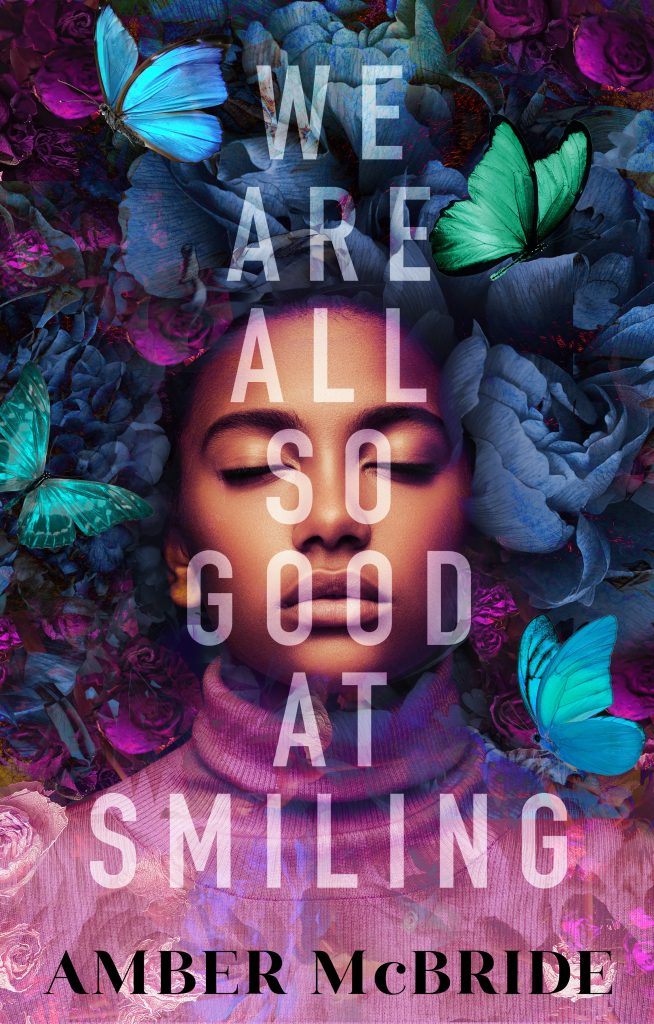Inspired by her own experiences with clinical depression and childhood grief, National Book Award finalist Amber McBride published We Are All So Good at Smiling, her second young adult novel in verse, earlier this year.
Though heavy at times in its examination of the lasting impacts of trauma—and complete with content warnings for readers who might not be in a place to handle that heaviness—it’s a book that ultimately celebrates the power of friendship and family, as well as the beauty that is possible through community and healing.
The novel’s protagonist, Whimsy, and her friend Faerry are each magical in their own way, grappling with childhood traumas as well as societal stigmas around mental health, heightened by their experiences of white supremacy and racism as Black teens in contemporary America. The authenticity of their experience is vivid; McBride’s verse shifts nimbly between fantastical, fairy tale-inspired imagery, and rigorous realism, probing experiences of trauma, false narratives of self, and the work of trying to erase the past, which itself can feel like an attempt at magic.
In addition to her novels, McBride teaches English at the University of Virginia, and has two books of poetry—an adult poetry collection as well as a young adult poetry anthology that she is co-editing—due to arrive on shelves next year. The author is also completing a new middle-grade novel in verse that will be out later this year. The prolific writer and imaginative storyteller credits her students with helping inspire her work. “Something about writing for young people always makes me braver, and my students at UVA also really inspired me because they were so open about talking about their feelings during the height of the pandemic,” she says.
McBride reflects candidly on her own process. “During the height of COVID, I witnessed so many people struggling with their mental health, which really was the catalyst for me starting We Are All So Good at Smiling,” she says. “I don’t know that I knew I was ready to write the book—at the time I was in the middle of what turned out to be a three-year depressive episode—but it felt like the thing I needed to do. Perhaps I needed to travel through my own haunted garden along with Whimsy and Faerry.”

Readers of McBride’s acclaimed debut, Me(Moth), will recognize many of the themes explored in We Are All So Good at Smiling. “Hoodoo and magic always show up in my books because it is fundamentally a part of my lived experience,” says McBride. “I am also interested in truth and what that means to different people. Is something true because that is how you remember it? Do we remember aspects of history or reality incorrectly because we can’t handle the truth and what conditions are necessary for us to face the truth? In my books the conditions necessary usually include a … need to feel safe before they can face their truths. I think that is often the case in life.”
Indeed, Hoodoo and magic are strong influences in how Whimsy understands and creates a (tenuous) feeling of safety, drawing on lessons learned from her grandmother and the conjuring skills she shares with her parents. Not to be confused with a religion, McBride describes Hoodoo as “an African American folk magic system that was created when Africans were stolen from their homes, enslaved in America, and told that they could no longer practice their own beliefs. The practice blends herbalism, offerings, and ancestral elevation to bring about good luck and healing.” As seen with Whimsy, Hoodoo is often shared across generations, passed down through families. This is also how McBride began her practice, though she has also continued to build on those foundations, incorporating “tea leaves, tarot, and plants to form connections with [her] ancestors and nature.”
Drawing inspiration from this work, each chapter in We Are All So Good at Smiling is accompanied by a reading of tea leaves or information about one of the many plants used in Hoodoo practices. “I really wanted to use more herbs and plants in this book because they are such useful allies and protectors,” reflects McBride. “Each plant signals what is coming in the chapter [and] the same for the tea leaves—it all foreshadows.”
Fairy tales also play an integral role in shaping the story, influencing the imagery employed throughout, and supplying characters who play important roles in the Garden of Sorrow that Whimsy conjures as a way of working through her depression and grief. “When it came to writing about depression, I knew folklore and fairy tales had to be included because they all represent a universal truth at the core,” McBride says.
“I also wanted to show that no one, not even Baba Yaga or Anansi the spider, is immune to depression. It is not something to be embarrassed about,” says McBride. “Mental health [is] a topic that I am extremely passionate about because of my own experiences, but also because of the continued lack of access to resources for those who need help. We don’t have time for taboo and stigma, we need to start talking more openly about depression and I hope this book facilitates some of these conversations.”
